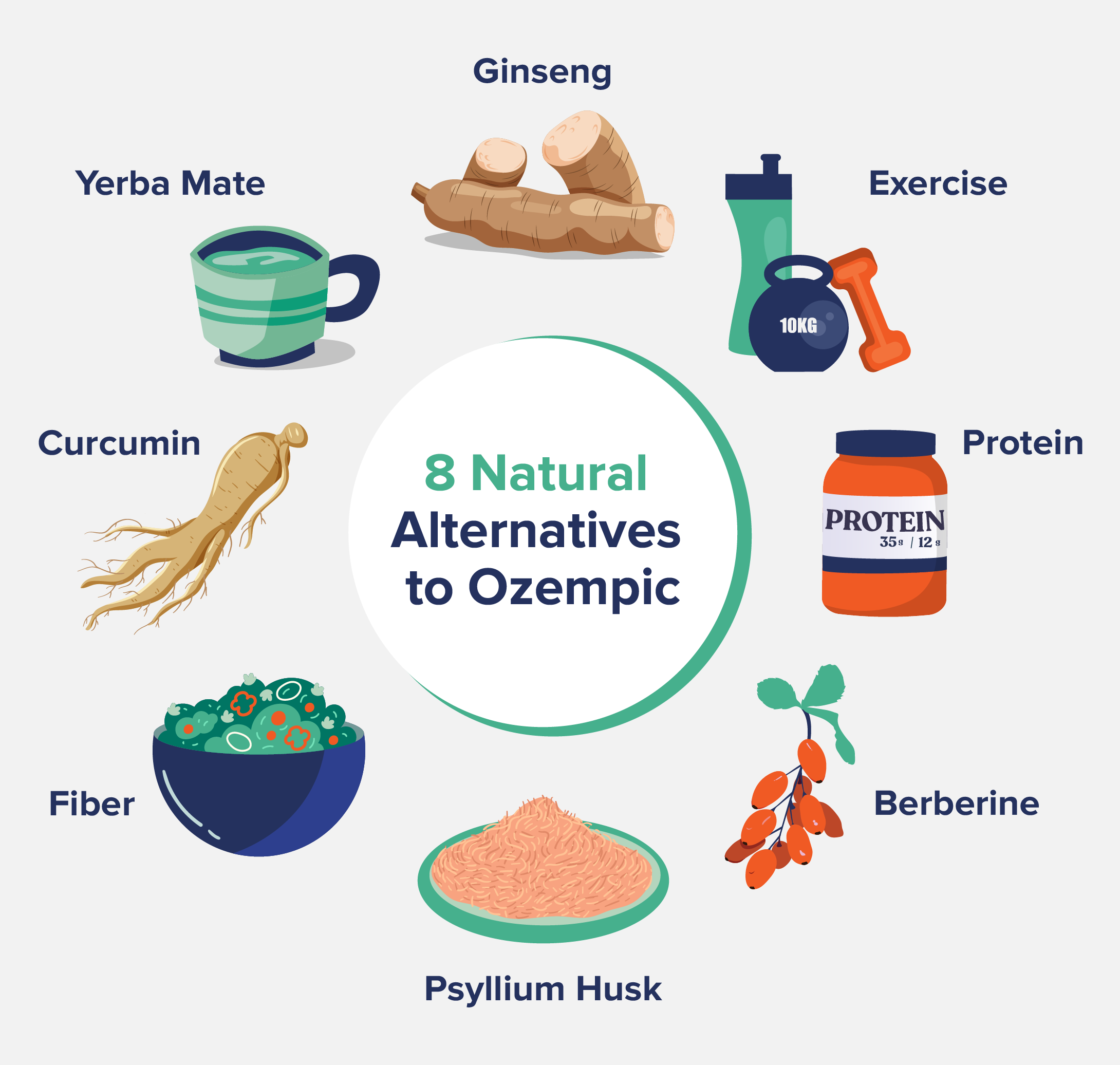Save $40 on your initial consult with a TNI Dietitian!
Talk to a real Dietitian for only $99: Schedule Now
Evidence Based Research To fulfill our commitment to bringing our audience accurate and insightful content, our expert writers and medical reviewers rely on carefully curated research.
Read Our Editorial Policy
Ozempic is everywhere these days, and for good reason, as it’s helped millions of people successfully lose weight.
But not everyone wants to rely on a prescription, and not everyone needs to. As a result, many are seeking natural alternatives that can offer similar benefits.
While Ozempic is highly effective for weight loss and blood sugar control, there are natural alternatives, like berberine, yerba mate, and plain ol’ protein, that may offer similar benefits—but without the side effects. Although nothing works quite like Ozempic, these natural alternatives act on similar pathways and can help with weight loss, blood sugar management, and appetite regulation, without the prescription bottle.

Berberine is often referred to as “nature’s Ozempic” due to its beneficial effects on weight loss and blood sugar management.
It activates an enzyme called AMP-activated protein kinase (AMPK), a sensor for low ATP levels inside cells.
When energy levels are low, AMPK helps restore balance by improving insulin sensitivity, reducing glucose production in the liver, and enhancing glucose uptake in muscle cells. These actions can lead to lower blood sugar levels and modest improvements in lipid metabolism.
Studies show that berberine also moderately reduces body weight, body mass index (BMI), and waist circumference.1
However, as it doesn’t act on GLP-1, berberine’s nickname might actually be more accurate as “nature’s metformin,” the most common medication for lowering blood sugar in type 2 diabetes.
Fiber slows glucose absorption and keeps you fuller longer, which helps regulate appetite and blood sugar—similar to GLP-1 agonists.
Some of the top fiber-rich foods include lentils, peas, beans, raspberries, avocado, chia seeds, and other vegetables, fruits, whole grains, and legumes.
Fiber has been well-studied for its role in weight loss and blood sugar management.2,3 While dietary fiber is best, some fiber supplements may be able to help (as we’ll see in the next section).
Get a science-backed calorie & macro plan to lose weight sustainably, built for your life.
Get a science-backed calorie & macro plan to lose weight sustainably, built for your life.

Psyllium husk is a type of soluble fiber often used as a supplement that absorbs water and forms a gel-like substance in your gut.
Because of its gel-forming properties, psyllium husk slows down digestion, increases feelings of fullness, and helps regulate blood sugar levels after meals—much like Ozempic slows gastric emptying.
A recent meta-analysis of six studies found that overweight or obese people who took psyllium husk before meals (totalling an average of 10.8g per day) had significant reductions in body weight, BMI, and waist circumference compared to placebo groups.4
Keep in mind that you should drink plenty of water when taking psyllium husk and start out slowly when introducing it to your diet, as consuming too much too fast can cause bloating or gastrointestinal issues.
Okay, so exercise isn’t a supplement, but if it could be bottled, someone would definitely make billions off its benefits.
Regular movement boosts your body’s insulin sensitivity and increases muscle mass, both of which help regulate blood sugar and appetite naturally.
Even though you probably equate long workouts with feeling hungrier, research has actually found the opposite to be true—intense exercise has been shown to reduce feelings of hunger and decrease appetite-stimulating hormones like ghrelin.5
Plus, exercise improves mitochondrial function, reduces inflammation, and supports long-term weight management.
Dietary protein isn’t technically a GLP-1 agonist like Ozempic, but it does stimulate the release of GLP-1 naturally in the body—this is why protein is so satiating.
When you eat protein, your gut releases various hormones, including GLP-1. This contributes to slower gastric emptying, increased fullness after meals, and slower post-meal glucose spikes.
Yerba mate is a traditional South American tea loaded with bioactive compounds like caffeine, theobromine, and polyphenols.
Again, it’s not a GLP-1 agonist, but it has some properties similar to those of Ozempic.
Some research has shown that yerba mate can suppress appetite, increase metabolic rate, and boost fat oxidation.
One small study found that people who took yerba mate supplements lost more fat mass and reduced their waist-to-hip ratio compared to a placebo.6
Another showed that it helped reduce appetite and delayed gastric emptying—a key mechanism behind how GLP-1 medications work.7
Curcumin is the main bioactive compound in turmeric, and it’s known for its potent anti-inflammatory and antioxidant activity—but it also may help with insulin sensitivity, blood sugar management, and possibly weight loss.
Some small studies have found that curcumin supplementation reduced BMI and waist circumference, but those effects were most pronounced when paired with healthy lifestyle changes, like a healthy diet and exercise.8
Ginseng is a plant root that has been used in traditional healing practices in Asia and North America for centuries.
Ginseng (especially Panax ginseng) may help lower blood sugar levels, improve insulin sensitivity, and reduce inflammation.
Some studies also suggest that ginseng can help manage appetite and support weight loss, although more research is needed.9,10
Ozempic, also known as semaglutide, belongs to a class of drugs called GLP-1 receptor agonists.
These drugs mimic a naturally occurring hormone called glucagon-like peptide-1 (GLP-1), which helps to regulate metabolism and appetite. In addition to Ozempic, other similar GLP-1 agonists include Mounjaro, Rybelsus, and Wegovy.
GLP-1 reduces calorie intake by lowering appetite and slowing gastric emptying, which means food moves more slowly through the digestive tract. These actions lead to increased feelings of fullness and a decrease in overall food intake.
Therefore, other compounds that mimic these actions may act as natural alternatives to Ozempic or other GLP-1 receptor agonist medications, such as Mounjaro, Rybelsus, and Wegovy.
While natural alternatives to Ozempic might be helpful for some people and come with fewer side effects, they aren’t a one-size-fits-all solution.
That’s where a Registered Dietitian (RD) can help, as RDs can tailor recommendations to your unique needs, preferences, and health history.
Dietitians have the expertise and education to interpret the latest research on supplements like those mentioned above, so you don’t waste your time on trends or ineffective fads.
Instead, you’ll get evidence-based advice aligning with your health goals, helping you make informed decisions about which natural alternatives may benefit you.
If you’re considering a natural alternative to Ozempic, a Registered Dietitian can help you choose the right approach—book your first virtual consultation today!